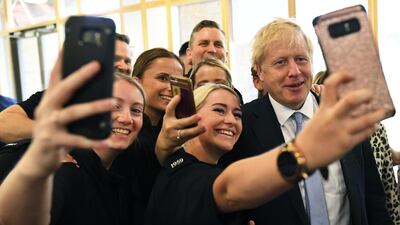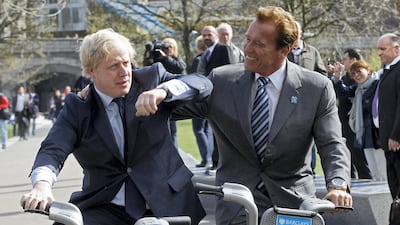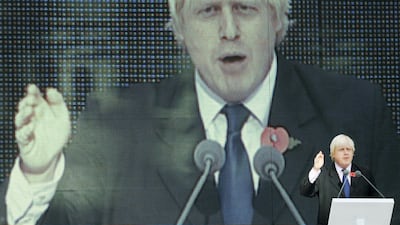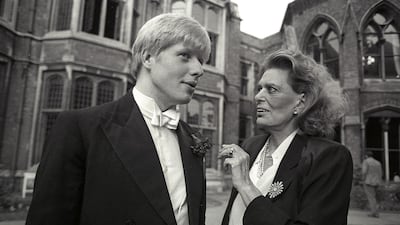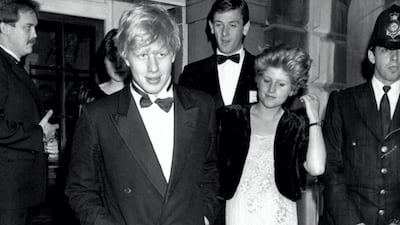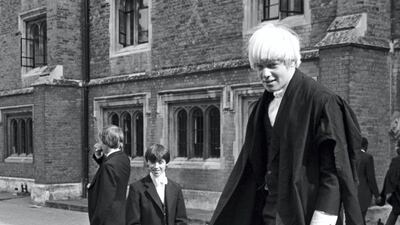Boris Johnson could not fail to catch the eye among journalists attending a press conference in the English port of Dover during a long strike by cross-Channel ferry crews more than three decades ago.
Chummy and self-assured, if unkempt, he arrived late and seemed out of place. Gazing at the rest of us, all seasoned reporters, he loudly marvelled at how we were taking notes, and in shorthand, whereas he took none.
Back then, in 1988, it was easy to dismiss this 23-year-old graduate trainee from The Times, the product of an Eton and Oxford education, as a bumbling, privileged chancer with no training to report on anything.
Certainly, no one present would have imagined themselves in the company of a coming star of polemic journalism, let alone a future prime minister.
His employers fired him a few weeks later after he enriched an archaeological story about the discovery of a royal palace with a shamelessly invented quote from his own godfather, the Oxford historian Colin Lucas.
But Johnson bounced back, as he has done at every setback to scale ever-rising heights of ambition.
Now, the man reputed to consider himself a latter-day Winston Churchill, about whom he wrote a highly readable biography, follows his hero into 10 Downing Street.
He may divide opinion more than most UK public figures. But despite forensic scrutiny of his private and public life, he is – for now – the power in British government.
____________
In pictures: Boris Johnson
____________
Cheerleaders acclaim a mould-breaker whose flamboyance, intellect and drive far outweigh the litany of unstatesmanlike outbursts. They ignore or minimise the private life foibles – including a loud domestic dispute, recorded by neighbours, with his girlfriend Carrie Symonds – and focus on his charisma and an implacable commitment to deliver Brexit with or without a deal.
Critics, at best, see a deeply flawed character still hopelessly out of place, still a bumbling chancer playing foot and loose with his country’s future.
It would be wrong, however, to suggest he has risen astronomically to a level neither he nor anyone else envisaged.
This is, after all, the same Johnson – or rather Alexander Boris de Pfeffel Johnson, on his own account a “one-man melting pot” with Jewish, Muslim and Christian roots – who, at eight, announced to his sister, Rachel, that he intended to become “world king”.
From the inauspicious start to his newspaper career, he grew to be a household name, writing for The Daily Telegraph, editing its political weekly, The Spectator, and twice winning parliamentary seats. He served a colourful term as mayor of London and occupied one of the highest ministerial offices, as foreign secretary.
Born in New York into an affluent, upper-class English family with Turkish blood on his father’s side, he never doubted his potential.
Oxford contemporaries, too, saw in him a future statesman. His tendency to feel above the irritation of rules was spotted even earlier.
Martin Hammond, his housemaster at Eton College, wrote in his 1982 school report: “I think he honestly believes that it is churlish of us not to regard him as an exception, one who should be free of the network of obligation which binds everyone else.”
At Oxford, he joined the Bullingdon Club, a reckless drinking society prone to vandalism.
Yet influential people are among those whose admiration triumphs over suspicion.
Conrad Black, the Canadian entrepreneur who owned The Daily Telegraph and The Spectator when Mr Johnson worked there, is a fierce champion.
Even when annoyed with him for breaking a promise not to chase a parliamentary seat while editing the magazine, Black – now Lord Black and fully pardoned by President Donald Trump this year despite a fraud conviction – was unwilling to obstruct.
In a series of uncomplimentary articles about Mr Johnson's rise, The Guardian recalled a 2001 party thrown in his honour by a newspaper proprietor, who declared: "If Boris wants to run for No 10, the Telegraph is behind him."
Max Hastings, the editor who hired Mr Johnson, denounced the former London mayor during the leadership campaign.
In an ensuing spat, Black defended Mr Johnson denouncing Hastings as an “ill-tempered snob with a short attention span”.
"There is certainly room for debate about Boris Johnson as prime minister," he wrote in the Spectator. "But he possesses a number of remarkable qualities considerably beyond the talents Hastings accords him as an entertainer and a clown.
“He had his lapses, but he was capable, successful and reliable when it counted, and he is, as he appears, a pleasant man … I think Boris will be fine.”
To Sonia Purnell, Mr Johnson's biographer (Just Boris: Boris Johnson: The Irresistible Rise of a Political Celebrity), he won't be fine at all.
His elevation to prime minister, Ms Purnell tells The National, propels the UK into "uncharted waters" during a national crisis.
Mr Johnson and Ms Purnell feuded when the pair worked in a Brussels office.
To enliven turgid EU coverage, Mr Johnson applied imagination, if not outright fabrication. Set on mocking bone-headed EU bureaucracy, he wrote about European meddling in everyday life and highlighted the lavish lifestyle of bureaucrats in Brussels.
“Over the months and years, those inventive stories, of fishermen forced to wear hairnets or snails reclassified as fish, created a deeply rooted belief that anything out of Brussels must be either loony or the result of a sinister continental plot,” Ms Purnell says.
Correspondents from other London news outlets came under pressure to match his output. They could not. The stories, while entertaining, were often early examples of fake news.
During the 2016 Brexit referendum campaign the pattern has since repeated as he exaggerated – wildly – benefits that Britain’s heath service might expect from funds otherwise earmarked for the EU. Facing Jeremy Hunt, his rival for the Conservative leadership, Mr Johnson waved a fish onstage and wrongly claimed the EU forced British fishmongers to deliver the product with “ice pillows”.
A loose grasp of language led to his worst blunder as foreign secretary. He wrongly stated that Nazanin Zaghari-Ratcliffe, a British-Iranian mother held in Tehran, was in the country training journalists, a statement that has prolonged her incarceration.
As mayor of London he said he would not visit parts of New York as there was a “real risk of meeting Donald Trump”. As prime minister he will immediately seek a first visit, changing his mind on Mr Trump, now seeing “method in his madness”.
When the British ambassador to the US, Sir Kim Darroch, sharply criticised the president in leaked internal messages, Mr Johnson cut the ambassador loose. Sir Kim resigned, seeing the writing on the wall.
But is Mr Johnson merely currying favour in the hope the US president will sign a preferential trade deal to help Britain weather post-Brexit economic storms?
Significant numbers of Britain’s vociferous army of anti-EU warriors have thrown in their lot with Nigel Farage’s rising Brexit Party. Mr Johnson's first priority is to counter Mr Farage's electoral threat and a strong relationship with the US is vital to that goal.
His simultaneous promise to “unify the country” seems hollow as he courts Britain’s Leavers across the bitter divide with Remainers. A raft of sackings, resignations and defections makes it hard enough for him to unite his own party.
France's main Sunday newspaper, Le Journal du Dimanche mischievously speculated on Mr Trump and Mr Johnson competing for attention at next month's Group of Seven (G7) summit of major world economies in the Atlantic resort of Biarritz. "Two platinum blond mops will probably emerge, two troublemakers who will not hesitate to rattle political correctness in the meetings and even spread fake news afterwards."
Another biographer and former colleague Andrew Gimson, author of Boris: The Rise of Boris Johnson, says it is impossible to predict how Mr Johnson will fare but is open-minded on the question of success.
He expects Mr Johnson to "do the big, liberal thing about EU citizens living in the UK" and use the £39 billion (Dh178.6bn) contribution owed by Britain to the EU as a bargaining tool. "Boris won't actually deny a big chunk of it is legally due – he'll just suggest that in practice, it won't be forthcoming until there's a deal."
"A lot of detractors seriously underestimate Boris," he tells The National. "He starts with very low expectations and I believe his chances of success are actually a great deal higher than people who really hate him are prepared to admit."
Mr Johnson’s time at Downing Street may be short-lived – a general election or an insurmountable political crisis looms – but it won't be boring.
